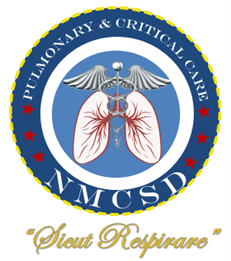- Rotation Director: George Cheng, M.D.
- Rotation Location: UCSD Hillcrest Medical Center, UCSD Jacobs Medical Center
- Rotation Duration: One or Two 4-week block for PGY5-6
- Trainees/month: One
Rotation Description:
The Pulmonary Special Procedures Service provides diagnostic and therapeutic interventional services related to the upper and lower airways, pulmonary parenchyma, and the pleural space. The fellow will work under the direct supervision of Dr. Cheng while performing invasive pulmonary procedures on adult male and female patients in the pulmonary procedure’s unit, hospital ICUs, and operating room.
Rotation Objectives:
- Knowledge based objectives:
- Gain in-depth knowledge of the anatomy of the upper and lower airways.
- Understand the indications, risks, and benefits of interventional pulmonary procedures.
- Gain familiarity with instrumentation related to interventional pulmonary medicine (flexible and rigid bronchoscopes, light sources, biopsy forceps, transbronchial needles, protected brush catheters, Cope biopsy needle, thoracostomy tubes, suction devices, endobronchial tubes, etc.)
- Formulate differential diagnoses based on clinical presentation and results of laboratory and radiographic data.
- Interpret chest radiographs and chest computed tomographic studies.
- Gain clinical experience in flexible fiberoptic bronchoscopy and associated skills:
- Endobronchial needle aspiration and biopsy
- Transbronchial needle aspiration and biopsy
- Bronchoalveolar lavage
- Protected brush catheter
- Bronchoscopic intubation
- Foreign body retrieval
- Gain clinical experience with pleural procedures:
- Thoracentesis
- Ultra-sound guided thoracentesis
- Pleural biopsy
- Chest tube insertion and management
- Pleurodesis
- Gain clinical experience with miscellaneous pulmonary interventional procedures:
- Transtracheal aspiration
- Percutaneous tracheostomy
- Transtracheal oxygen catheter placement
- Transthoracic needle aspiration
- Observe and assist in advanced pulmonary interventional procedures:
- Stent placement
- Rigid bronchoscopy
- Laser bronchoscopy
- Brachytherapy
Learning Venues and Teaching Methods:
Direct Patient Care:
- UCSD IP Clinic, Operating Room, ICU and Wards
- NMCSD Pulmonary Clinic
Suggested reading:
- Flexible Bronchoscopy, Edited by Ko-Pen Wang and Atul C. Mehta, Publisher: Blackwell Science
- Manual of Pleural Procedures, Edited by Colt and Mathur, Publisher, Lippincott, Williams and Williams, Philadelphia
- Textbook of Respiratory Medicine. Edited by Murray and Nadel. W.B. Saunders and Company.
- Practical Guide to Interventional Pulmonology, Edited by Momen M Wahidi, MD, MBA and David E Ost, MD,
Evaluation:
The Trainee will receive a written evaluation at the end of the rotation based on cognitive, patient management, procedural and humanistic skills. This evaluation, including areas for improvement, will be discussed personally with the trainee at the end of the rotation and then forwarded to the Program Director for inclusion in the trainee’s permanent file.
